
19 August 2025
The CAR-T Party
Single-domain antibodies (sdAbs) appear to be excellent targeting molecules for Chimeric Antigen Receptor (CAR)-T cell therapies! This has also nicely been summed up by Guo and Xi. CAR-T cells are engineered T cells that express a Chimeric Antigen Receptor (CAR) on their surface. This CAR allows the T cell to recognize and bind to a specific antigen on cancer cells. Although CAR-T has been a breakthrough and has already made a tremendous impact in the clinic for blood cancers, there are still some hurdles to overcome for solid cancers.
Read more
14 July 2025
Keys to Plus Ultra Utrecht
Last Friday, we officially received the keys to our new state-of-the-art laboratory and office space on the 12th floor of Plus Ultra Utrecht, provided by Kadans Science Partner. We remain in the heart of the Utrecht Science Park, surrounded by a lot of knowledge, the hospital and a great industrial eco-system, but in a highly inspiring environment which stimulates innovation, this move reflects a significant step in the professionalization of our organization.
Read more


01 July 2025
Anti-Tubulin sdAb
A decade ago, the groups of Lukas Kapitein at Universiteit Utrecht University and Helge Ewers at Freie Universität Berlin showed that superresolution imaging with antibodies can be enhanced by using smaller probes like single-domain antibodies (sdAb). For example, the resolution of single molecule localization microscopy (SMLM) images of Tubulin could be substantially improved by using anti-tubulin sdAbs.
Read more
17 June 2025
Publication Alert – Detecting and Modulating CXCR4 Clustering with Single-Domain Antibodies
We are happy to share this recent publication resulting from a collaborative effort between Vrije Universiteit Amsterdam (VU Amsterdam), Amsterdam UMC, and QVQ Holding BV. This study showcases the potential of functionalized single-domain antibodies (sdAbs) in biomedical research and therapeutic development. By utilizing different fluorescent and luciferase-fused sdAbs, we were able to monitor the presence of higher-order clusters of CXCR4 on leukemic cells.
Read more


11 June 2025
QVQ/UU consortium secures funding on pandemic preparedness
We are proud to announce that QVQ, in collaboration with the Virology group of Universiteit Utrecht (Utrecht University), has won the competitive P3Dx Pandemic Preparedness by Pathogen Detection Innovation Challenge Tender from TNO.
Read more
10 June 2025
QVQ at Antibody Engineering & Therapeutics Europe 2025
Antibody Engineering & Therapeutics Europe 2025 is just around the corner — and QVQ will be there! We’re proud to have Edward Dolk and Raimond Heukers representing us at one of the leading events in antibody innovation. With 80+ expert speakers and over 300 attendees from across the globe, AE&T is a chance to connect directly with those that shape the future of antibody research, engineering, and therapeutic development.
Read more


03 June 2025
QVQ is proud to be a Platinum sponsor of the Single Domain Antibodies Conference 2025!
It is THE conference dedicated to the smallest antibody fragment class, also referred to as VHH, sdAbs or nanobodies (trademark Sanofi).
Read more
27 May 2025
Expanded options for protein production
QVQ offers the production and purification of single-domain antibodies (sdAbs or VHHs) and VHH-based fusion proteins, using a range of expression systems including E. coli, S. cerevisiae, and ExpiHEK cells.
Recombinant antibodies play a fundamental role in molecular biology, biotechnology, and pharmaceutical R&D. With the flexibility to express sdAbs in bacterial, yeast, or mammalian cells, we tailor our approach to meet the specific needs of each application.
Read more


20 May 2025
Join QVQ at the FEBS Advanced Lecture Course!
Next week, Matti Pronker will be in Groningen for the FEBS Advanced Lecture Course: Emerging Insights from Structural Biology into Molecular Mechanisms of Diseases, where he will join researchers from around the world to discuss the latest developments in structural biology.
Read more
30 April 2025
QVQ will be at the DSCB Trippenhuis Meeting in Amsterdam
Next week, one of our scientists, Stephanie Anbuhl, will join the Trippenhuis meeting in Amsterdam. At this annual meeting of the Dutch Society of Cell Biology (DCSB), Stephanie will give a talk about applications of functionalized sdAbs for the detection of GPCRs.
Read more


29 April 2025
QVQ will be at the BCF Career Event
On May 28, 2025, you can find us at the BCF Career Event at Jaarbeurs Utrecht – the leading career fair for anyone in life sciences, chemistry, food, and pharma.
Are you exploring new opportunities or just curious about who we are and what we do? Make sure to stop by our booth!
We’re excited to connect with talent and explore how we can grow together.
Read more
22 April 2025
QVQ approved for French Research Tax Credit (CIR)
We are thrilled to announce that the French Ministry of Higher Education, Research and Innovation has granted a favorable opinion for our Research Tax Credit (CIR) application.
This approval is valid for the next three years, retroactive to 2024 and extending to 2026. As a result, our customers can now benefit from a tax credit for our R&D support, covering up to 30% of the amount spent.
Read more


02 April 2025
15% Discount on all productions requested in April
We’re celebrating 15 years! To mark this special milestone, we’re offering a 15% discount on all productions requested throughout the month of April! This offer is valid for all production requests made in April.
Read more
01 April 2025
QVQ will be at the Dutch Complement Symposium
On April 11, Stephanie Anbuhl and Gillian Dekkers will be present at the Fletcher Hotel Sparrenhorst in Nunspeet to join scientists for the 5th Dutch Complement Symposium.
Read more


25 March 2025
QVQ is platinum sponsor of the sdAb conference
QVQ is proud to be the platinum sponsor of THE conference dedicated to the smallest antibody fragment class.
We would like to welcome you to mingle with sdAb experts from industry and academia in the fantastic city of Utrecht in September…
Read more
20 March 2025
QVQ celebrates 15 years of innovation in biotechnology
This month marks a special milestone in QVQ’s history: our 15th anniversary!
Since our founding in 2010, we have been dedicated to advancing the field of biotechnology with a focus on single-domain antibodies.
Thanks to the dedication, and hard work of our growing team, we have built a reputation as a trusted partner for single-domain antibody services, collaborating with our customers on innovative discovery, characterization, and engineering projects that push boundaries.
Read more

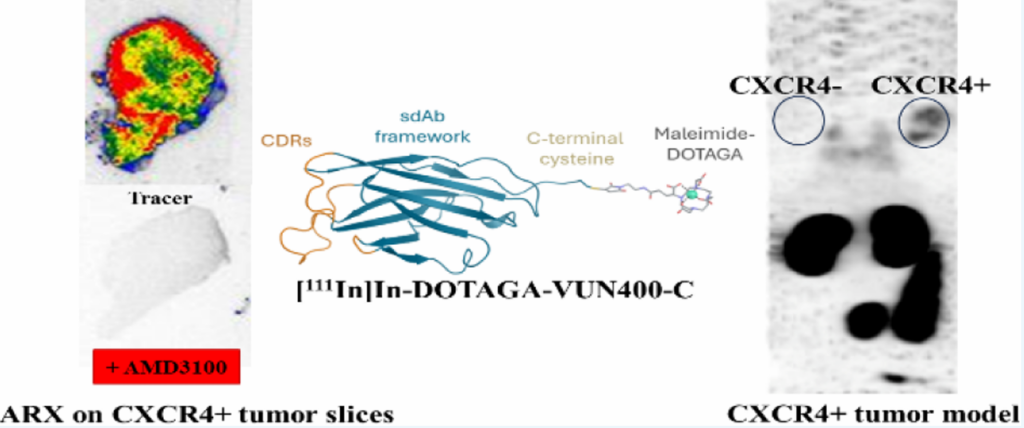
12 March 2025
CXCR4-targeting single-domain antibody Q84c as tumor tracer
This paper, published this week in Bioconjugate Chemistry, is the result of a fruitful collaboration of Stephanie Mareike Anbuhl, Matti Pronker, and Raimond Heukers from QVQ Holding BV and from the group of Prof. Frederik Cleeren at KU Leuven.
Read more
05 March 2025
Join QVQ at the European Molecular Imaging Meeting
Next week, Stephanie Mareike Anbuhl will be in Bilbao to join scientists from around the world to discuss the latest developments in molecular imaging.
Stephanie will present her poster “Functionalized single-domain antibodies for detecting and imaging GPCR complexes on cancer cells” (Poster# ONCO-006, first session).
Read more


11 February 2025
International Day of Women and Girls in Science
Today we celebrate the International Day of Women and Girls in Science!
This day is a reminder to acknowledge and honour the incredible contributions of women and girls in science, technology, engineering, and mathematics (STEM). While significant progress has been made towards gender equality in these fields, a report of the United Nations shows that there is still work to be done.
Read more
04 February 2025
Contributing to make a difference
Today is World Cancer Day — a day where millions of people worldwide come together to raise awareness about the importance of education, care, and research in the fight against cancer.
Cancer is not just one disease, but a complex group of many, making each case unique and the journey of diagnosis and therapy as well as cancer research highly challenging. Thanks to the ongoing efforts of academia and industry, there is continuous progress with constantly improving treatment options. Yet, the fight against cancer is far from over.
Read more

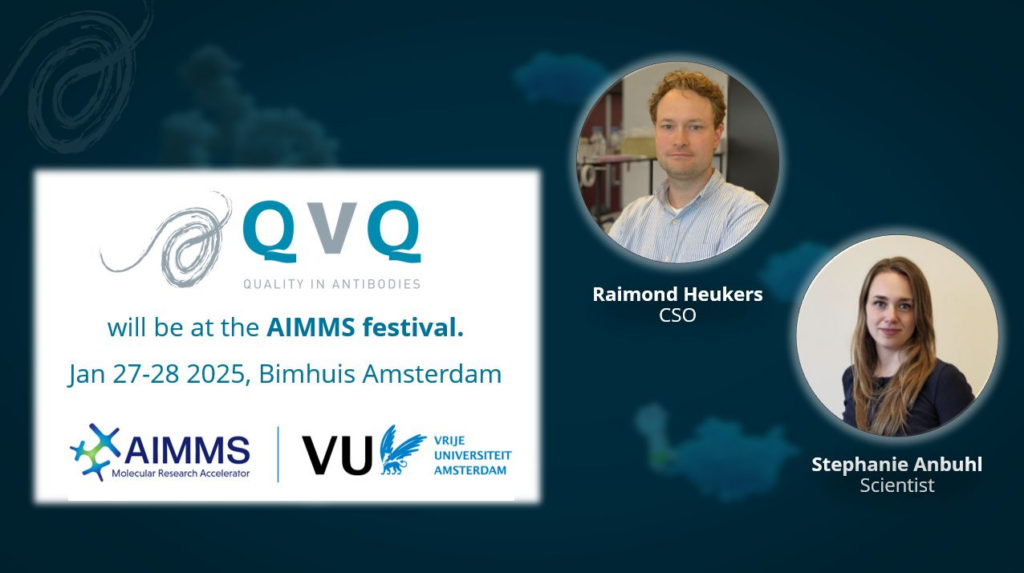
22 January 2025
QVQ will be at the AIMMS Festival
End of January, Raimond Heukers and Stephanie Mareike Anbuhl will be present at the Bimhuis in Amsterdam to join scientists from the Vrije Universiteit Amsterdam (VU Amsterdam) and other companies for the 2025 AIMMS festival organized by AIMMS VU.
Read more
15 January 2025
Join QVQ in these events to discuss your single-domain antibody needs in 2025
Mark your calendars and join us in 2025:
➡️ HollandBio Year Event – 25 January 2025 – De Flint, Amersfoort, The Netherlands
➡️ European Molecular Imaging Meeting l EMIM – 11-14 March 2025 – Bilbao, Spain
➡️ Antibody engineering and Therapeutics – 10-12 June 2025 – Basel, Switzerland
➡️ 4th Single-Domain Antibodies Conference – 29 September – 1 October 2025 – Jaarbeurs, Utrecht, The Netherlands
Read more


14 January 2025
Single-domain antibody monomerizes CXCR4 and inhibits cancer cell growth and migration
In this recent preprint, researchers from the VU, AUMC, and QVQ, use single-domain antibodies (sdAbs) to modulate the chemokine receptor CXCR4.
Read more
08 January 2025
Affinity of sdAbs enhanced by various multivalent formats
QVQ offers unique single-domain antibodies against the class A G protein-coupled receptor CXCR4 (e.g. Q84 and Q85).
In this study, QVQ, together with the group of Professor Martine Smit, further improved the already high affinity and antagonistic potency of one of these sdAbs by constructing various multivalent formats.
Read more


19 December 2024
Functionalized single-domain antibodies detecting receptor clusters on cancer cells
Using a combination of luminescent and fluorescent sdAbs, this recent preprint describes the detection of endogenous CXCR4 clusters by BRET. This receptor clustering is increased upon enhanced expression in cancer cells and has been linked to cancer progression.
Read more
18 December 2024
Successful PhD defense of our scientist Stephanie Mareike Anbuhl
Stephanie did her PhD at QVQ as part of the Marie-Curie ITN ONCORNET2.0 in close collaboration with the group of Martine Smit at the VU. In her PhD thesis “Nanobody formats and conjugates detecting, modulating, and targeting CXCR4”, she described the functionalization of sdAbs for various applications. These modified sdAbs were used to investigate the role of the chemokine receptor CXCR4 in cancer. Last week, 4 years of work were concluded with a great defense, that the whole QVQ team was happy to attend.
Read more


28 November 2024
Introducing QSyLi: QVQ’s unique synthetic single-domain antibody (sdAb) library!
Built with 15+ years of sdAb experience, QSyLi combines the diversity of an entire VHH germline with cutting-edge nature-inspired diversification. Designed to accelerate discovery, QSyLi eliminates immunization while enabling exploration of non-immunogenic and toxic targets.
Read more
19 November 2024
QVQ at the GPCR Forum Conference
On November 25th, Stephanie Anbuhl will represent QVQ at the 1st edition of the virtual conference of the GPCR Forum. As one of the invited speakers, Stephanie will present her PhD work on single-domain antibodies targeting the class A GPCR CXCR4. The GPCR forum brings together the global community of GPCR networks. QVQ actively participated as a partner in the Marie Curie International Training Network ONCORNET2.0 focused on the GPCRs CXCR4 and ACKR3.
Read more

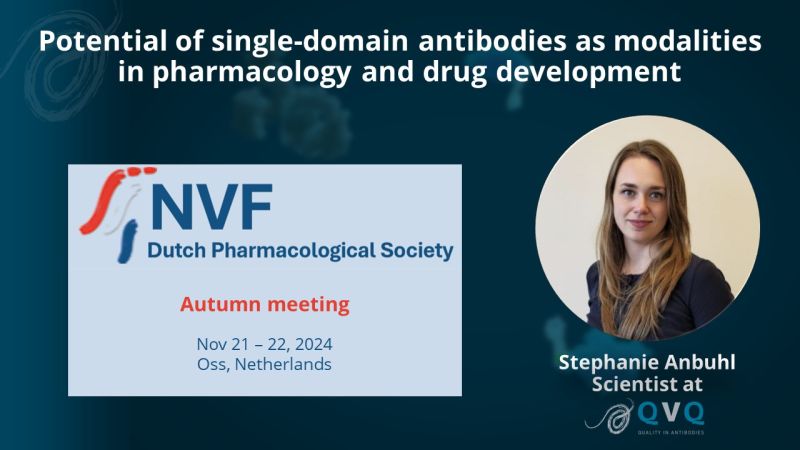
12 November 2024
QVQ at the NVF autumn meeting
On Nov 22nd, our scientist Stephanie Anbuhl will present in Session 4, entitled ‘New modes of drug activity’ on the NVF Autumn Meeting in Oss.
The meeting is organized by NVF, Nederlandse Vereniging voor Farmacologie – Dutch Pharmacological Society.
Read more
10 November 2024
QVQ at Kadans Innovation Summit
QVQ’s CEO Dr. Edward Dolk will be joining the Kadans Innovation Summit on the 13th and 14th of November in London to meet leading researchers, entrepreneurs, and innovators from the Europe-wide Kadans science clusters.
Read more
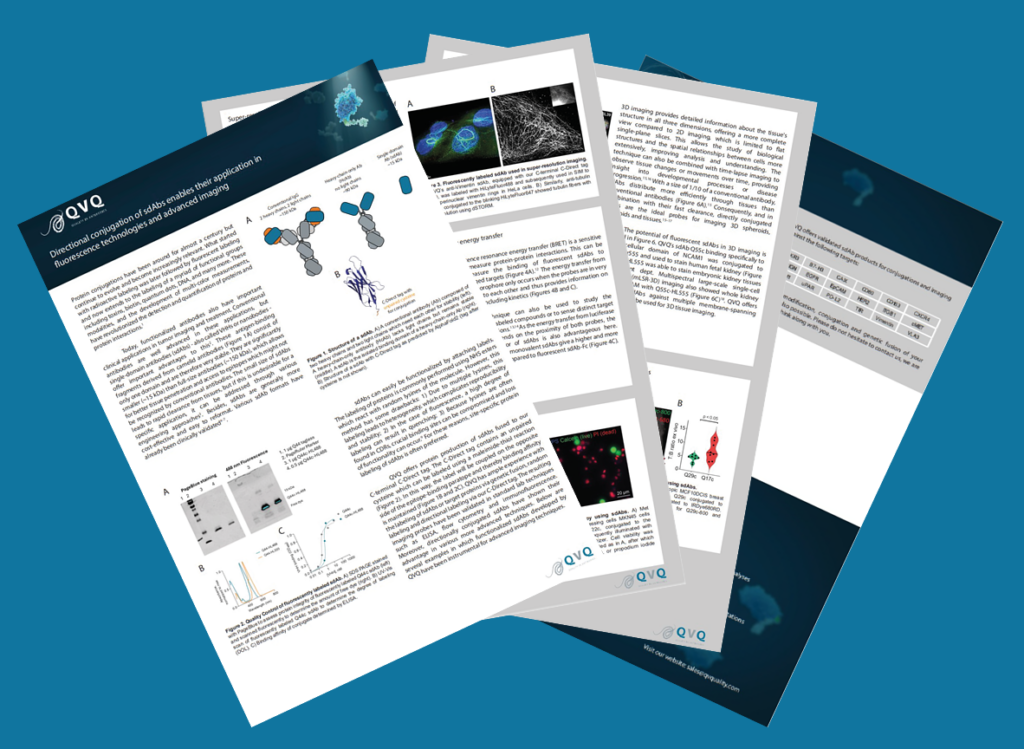
08 November 2024
Discover the applications of our fluorescent single-domain antibodies
Our recent application note highlights the advantages of fluorescent single-domain antibodies (sdAbs) in fluorescence-based technologies and advanced imaging.
Due to their small size, labeled sdAbs have a small linkage error leading to robust signals and improved resolution. They are also cleared quickly from the bloodstream and have enhanced tissue penetration leading to good signal-to-noise ratios.
Read more
01 November 2024
QVQ at PEGS Europe in Barcelona
Dr. Matti Pronker will be attending the 16th PEGS Europe Protein & Antibody Engineering Summit in Barcelona from the 5th to the 7th of November.
Matti will present his poster on the high resolution structure of the FLAG peptide in complex with the M2 anti-FLAG antibody. Besides that he will be available for all your single domain antibody engineering questions.
Read more

01 November 2024 Date Year
QVQ at BIO Europe
Next week, our CSO Dr. Raimond Heukers will be present at the BIO-Europe, Europe’s premier partnering event. (November 4-5, Stockholm, Sweden). You can schedule a meeting with Raimond to discuss QVQ’s single-domain antibody services.
Read more
10 October 2024
QVQ partners with DataChaperone
Being a CRO, service is at the core of everything we do. From this, properly processed and analyzed data-packages are important deliverables. QVQ has partnered with DataChaperone to take data analysis and reporting workflows to the next level.
Read more


24 September 2024
New anti-CD9 sdAbs prevent HIV-1 replication
ogether with fantastic collaborators at the Amsterdam University Medical Center, in particular Jeffrey Umotoy and Steven de Taeye, we have generated a set of new single-domain antibodies against the challenging tetraspannin (4TM domains) CD9 described in this recent publication.
Read more
03 July 2024
QVQ at the ULLA Summer School
On Friday July 5th 2024, our CSO Raimond Heukers, will be at the ULLA summerschool in Leiden, to take an international group of pharmaceutical science researchers (MSc, PhD and postdocs) into the wonderful world of single domain antibodies (sdAbs).
Read more

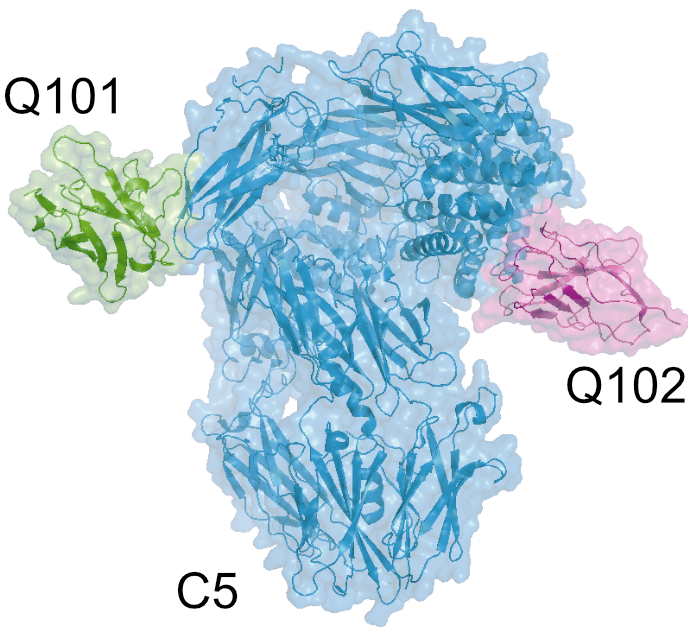
24 June 2024
sdAbs binding and inhibiting complement factor C5
Our single domain antibodies (sdAbs) Q101c/Q102c detect and inhibit complement factor C5.The two single domain antibodies recently published are available as products Q101c and Q102c. Both sdAbs recognize C5 and its R885H variant and inhibit C5 cleavage, as described in this JBC paper by Eva Struijf et al.
Read more
24 Jun2 2024
Anti-Siglec1 sdAbs as targeting ligands on liposomes
We would like to congratulate our partners from the CanNanoVac consortium, the lab of Joke den Haan, with their latest publication on targeting Siglec1 with sdAb-decorated liposomes. This work not only illustrates the application of sdAbs as targeting ligands on liposomes, it also showcases QVQs ability to generate lead molecules against heavily glycosylated targets.
Read more

24 June 2024
Vacation Listening Tip: Discover Facts and Science with Stuff You Should Know podcast!
Looking for something interesting to listen to while you unwind on vacation? Josh Clark and Chuck Bryant of the Stuff You Should Know podcast have you covered! In a recent episode, they delve into the history and funny facts of camelids, with a special focus on llamas.
Read more
20 June 2024
Dream3D lab led by Anne Rios describes a new screening platform for fluorescence-guided surgery (FGS) probes
Multispectral imaging of 3D patient-derived organoids not only generates beautiful images but also allows for the identification of potential new targets and detection probes to recognize tumor tissue during surgery.
Read more


XX Date Year
Q123, a new product binding atypical chemokine receptor 3 (ACKR3) as neutral antagonist
Q123, also known as VUN701, a single domain antibody binding human atypical chemokine receptor 3 (aka CXCR7) with nanomolar affinity, is now available for research use.
Read more
14 March 2023
NanoB2 for assessing binding of ligands to drug targets
In a collaborative project, researchers at QVQ (Stephanie Mareike Anbuhl and Raimond Heukers), VU Amsterdam (Martine Smit lab) and University of Nottingham (Laura Kilpatrick and Steve Hill) have developed a novel approach using labeled VHH to easily assess and quantify binding of ligands to different drug targets.
Read more
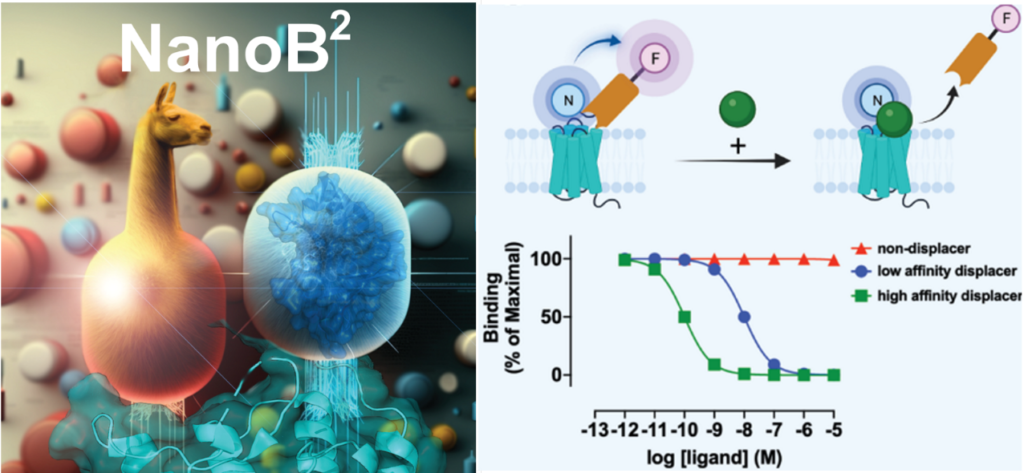
01 March 2023
Stephanie Anbuhl wins poster prize on the annual MCCB KNCV meeting in Lunteren
On Thursday the 30th of March 2023, our talented early-stage researcher (ESR) within the ITN project ONCORNET2.0, Stephanie Mareike Anbuhl , presented her poster on the reformatting of improved CXCR4-targeting single domain antibodies for biophysical detection methods on the annual meeting of the Medicinal Chemistry & Chemical Biology (MCCB) division of the Royal Netherlands Chemical Society (KNCV) in Lunteren.
Read more
15 March 2023
Anti-NCAM1 single domain antibody on the cover of Nature Protocols (blue color).
Big thanks to the group led by Anne Rios, who did an excellent job with establishing the mLSR-3D method for multispectral confocal 3D imaging.
This nicely illustrates the excellent organ penetration of single domain antibodies and its suitability for imaging
Read more
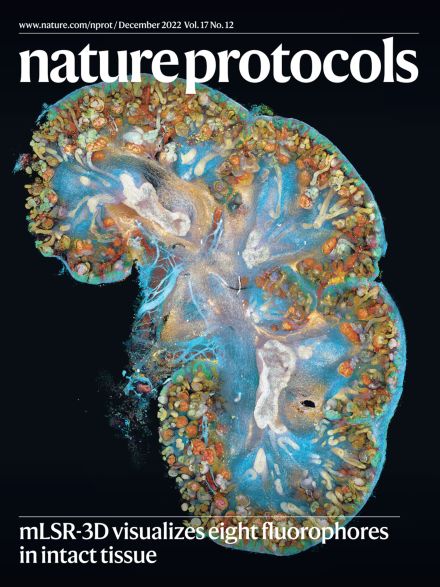

26 August 2022
REACT: HIV reactivation and targeted removal by gene editing
QVQ has intensified its collaboration with the research group of Monique Nijhuis (Translational Virology, UMCU). The REACT project, part of Health Holland TKI-LSH, will investigate possible utilization of our anti-HIV single domain antibody products with mRNA containing lipid nanoparticles (LNPs).
Read more
22 June 2022
Stop the no. 1 elephant killer!
Elephant Endotheliotropic Herpes Virus (EEHV) is the most common cause of death among young elephants.
To aid the development of new detection agents and therapeutic intervention strategies, QVQ will contribute its lead-development to the crowdfunding project “Stop the no. 1 elephant killer!” lead by Utrecht University professors Victor Rutten and Xander de Haan.
Read more


22 June 2022
VHH-Fc fusion constructs show enhanced potency in blocking HIV
Congrats to our Target2Cure collaborators, among which PhD student Angela Schriek and under the supervision of Marit van Gils and Steven de Taeye (AUMC) for having published a nice study in Frontiers in Immunology. Schriek et al. describe the development of QVQ’s anti-HIV-1 single domain antibody products Q1 (J3), Q8 (2E7) and (Q9) 1F10 into various multivalent and Fc-fused constructs.
Read more
22 June 2022
Vimentin for cancer therapy
Congrats to the team lead by professor Arjan Griffioen for their excellent study on targeting extracellular vimentin for cancer therapy. This study also features our anti-vimentin product Q60c, a single domain antibody that suits well for detection and microscopy.
Read more

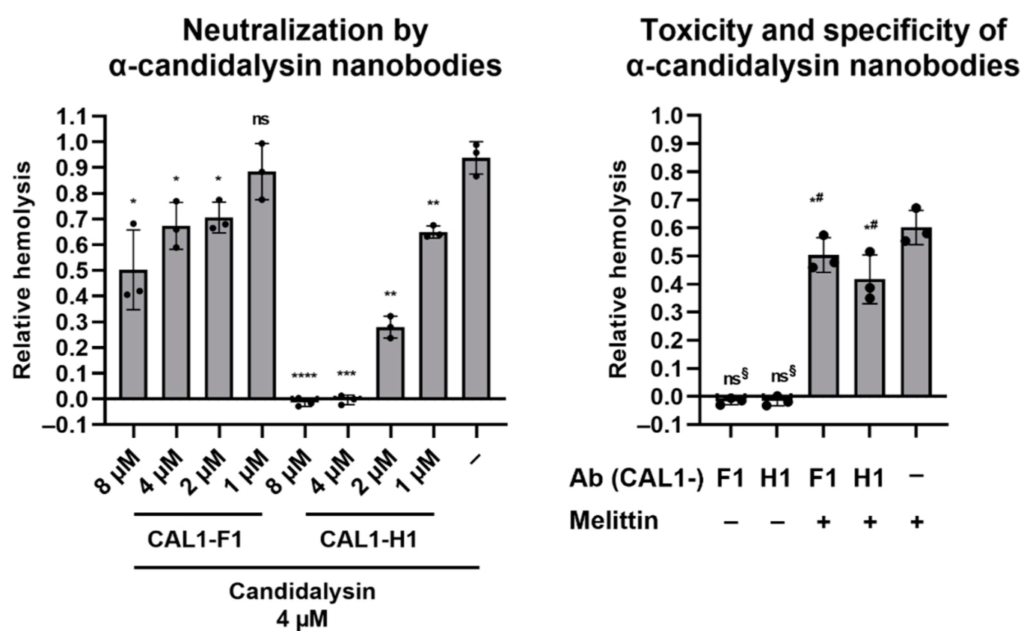
25 January 2023
Candidalysin causes C. albicans-associated haemolysis
Candida albicans is an opportunistic yeast naturally occurring on our body. This yeast can become pathogenic causing candidiasis. Candidalysin, a peptide toxin secreted by the fungus, is involved in Candida becoming pathogenic the mediates its translocation through intestinal epithelium causing serious infections.
Read more
